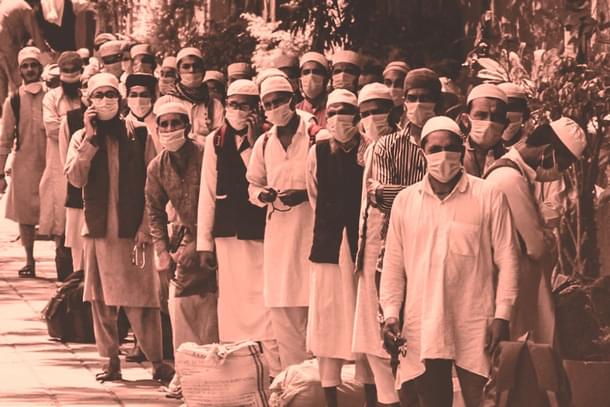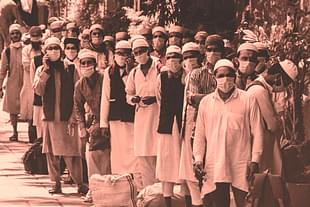Politics
Questionable Hygiene Practices At Delhi Centre Of Tablighi Jamaat May Have Played A Role In It Being A ‘Super-Spreader’ Of Covid-19
Swati Goel Sharma
Apr 03, 2020, 04:51 PM | Updated Apr 06, 2020, 09:01 PM IST
Save & read from anywhere!
Bookmark stories for easy access on any device or the Swarajya app.


Inmates at the New Delhi headquarters of Islamic organisation Tablighi Jamaat follow practices that “guarantee” the spread of the virus to other inmates, says a man from Telangana who stayed at the Nizamuddin-based building for three weeks in November.
Johny (name changed), who spoke to this correspondent over the phone, requested to be anonymous.
Johny, born a Christian, converted to Islam in June 2019 to win over his girlfriend’s family. Soon after the mandatory circumcision, which he got done in August, he joined Tablighi Jamaat on the advice of a “doctor”.
He stayed in several mosques across Telangana, before going to Delhi Markaz (markaz means centre) in November. The organisation, he says, teaches members to “imitate the life of Muhammad peace be upon him”.
“They teach us how to follow the tenets of Quran strictly and tell us to live as Muhammad peace be upon him lived. We follow him in everything we do – the way we eat and drink, and even urinate,” he says.
“There are guidelines even for sexual intercourse.”
Johny says he is deeply connected to the “orthodox” organisation and “strongly attached to Prophet”.
However, he says he has some issues with the way he and other inmates lived at the Markaz. He says the allegations that the Markaz is a super-spreader of the virus across India doesn’t surprise him.
“It’s like, if one person has it, it’s guaranteed that others will catch it too,” he says, and explains:
“We ate from the same utensil. We ate in a batch of four and used one big plate to put bread, rice and curry. We all ate from it together and would not use spoon or cutlery. Then we would leave the plate as it was. Another batch of four would come and eat from the same plate. This would continue for six or seven batches,” he says.
The washrooms, he says, were few and common. There is no fixed count of men residing in the Markaz at a given time, he says. “This is because men would keep coming and leaving in between. In my estimate, at its peak, there must have been more than a thousand men in the Markaz.”
“At any given point of time in the day, one could not use the toilet without waiting for at least half-an-hour. That’s how crowded the place was,” he says.
The washrooms, with 'Indian seats', would always stink given the large number of men who used it, he says. “But the toilets would be washed once a day by a cleaner.”
Notably, Dr Nutan Mundeja, who is director general of health services in the Delhi government, has been quoted by The Times of India in today’s edition as saying that one of the reasons that the large number of Markaz evacuees are testing positive for the virus is that the inmates were living in close proximity inside the building.
“They were sharing the same washrooms and utensils. I don’t think the results are surprising,” she told the newspaper.
Of Delhi’s current count of 293 cases, 182 are that of evacuees from the Markaz who attended an iztema (gathering) in March and stayed on after it concluded around mid-March, as per the Times of India report.
Johny further says that the building had a “small swimming pool kind of a water area” for ‘Wudu’. Wudu is a purification ritual among Muslims where they wash their faces, hands, arms and feet with water before performing namaz. “As all of us used the same water for Wudu, spread of such a virus is guaranteed,” he says.
Johny says he returned to Telangana by end of November. “I rented a room and lived separately from my family. I had not told them I was in Delhi,” he says.
“I wanted to live independently and by myself,” he says, and adds that he attended several iztemas of the organisation in Telangana in the coming months.
Through the conversation, Johny repeats that while he has issues with some of their practices, he is deeply attached to the organisation and that is because “they teach him how to live life the right way”.
Johny has no pictures of his stay at the Markaz. “Phones were strictly not permitted inside the building. Even if we took a selfie outside the Markaz, others would taunt us saying, ‘what kind of a Muslim are you’,” he says.
Asked why he uses phone or clicks his pictures now, Johny says rules are different outside of the Markaz. “In some things, they are too orthodox,” he says.
Johny says that in January, he had a bad bout of cough, cold and fever. “I never took any pill throughout. It subsided in 20-25 days on its own. I wonder if it was the virus. In any case, I am out of it now and there is no point of getting myself checked,” he says.
Johny says that in their sermons, the preachers stressed on “prayers” as a cure to every problem. “They taught us that we should be devoted to Allah and avoid visiting doctors and hospitals,” he says.
Does Johny agree? “Not really. If I fall seriously ill, I will go to a hospital. As I said, they can be too orthodox in some things.”
It is pertinent to mention here that it is the March iztema in Delhi Markaz that has come under the scanner of the authorities. Out of more than 13,000 people estimated to have attended the 10-day Tablighi Jamaat meeting in Delhi in mid-March, nearly 8,000 have been identified as high risk who may spread the virus across India.
Swati Goel Sharma is a senior editor at Swarajya. She tweets at @swati_gs.





